When news of a limited edition version of the long-long comic ZENITH broke last week, speculation centered on Grant Morrison, who, according to accumulated comic book lore, believes he owns the character. With ownership in doubt, Rebellion has declined to reprint the book for many years, making it one of the great “lost” comics. Rebellion seems to be testing the waters with a very limited and direct sales reprint of the book that only 1000 people will be able to preorder. It seemed to be a test case to see how far the legal objections from Morrison would go.
One player was missing in the equation: the OTHER Zenith creator, artist Steve Yeowell, who drew the books. (Brendan McCarthy designed the character.) Yeowell was made available for interviews in the original embargoed press release, a pretty strong indicator he, at least, wasn’t planning immediate legal action. However not one outlet was able to get Yeowell to comment when the news broke.
That silence has ended. Last week we emailed a bunch of fairly direct questions to the artist about the ownership and history of Zenith. As you can see, he’s answered many of them politically, but he’s at least somewhat on board.
The Beat: Can you talk about how you came to be involved in Zenith originally?
Yeowell: Grant and I had worked together previously on Zoids at Marvel UK. He, Brendan McCarthy and Steve Macmanus (then editor at 2000AD—and whom I’d drawn a “Future Shock” for), had been putting Zenith together. Brendan was unable to commit to drawing the series and so I was offered it.
The Beat: What was the response at the time? What was it you liked about working on it?
Yeowell: The response was overwhelmingly positive. I loved the character, the setting and the back story and I also loved the structure of that first series in particular, which steadily built the tension over successive episodes to a satisfying conclusion. It was a great piece of tight plotting—perhaps all the more effective for being in that five page episodic format.
The Beat: Zenith was seen as a modern, Gen X take on the superhero. Was that your take on him as well?
Yeowell: Pretty much—though when I redesigned his costume for the second series, I based his leather jacket on that worn by George Michael in the “Faith” video, so I’m not sure how Gen X you could consider him…
The Beat: Have you been involved in attempts to reprint it over the years?
Yeowell: Apart from contributing cover paintings to the original Titan collected editions and the “Best of 2000 AD” publications, no.
The Beat: It’s my understanding—through the rumor mill of comics—that one reason it wasn’t reprinted is because you and Grant Morrison believed that you owned it. Can you talk at all about the contractual circumstances of Zenith’s creation?
Yeowell: They were the same as applied to other characters at IPC at that time.
The Beat: Why is the book finally being reprinted—although in a very limited edition? How much did you cooperate with Rebellion on this edition?
Yeowell: I received a phone call from Mike Molcher of Rebellion in early May informing me that they had plans to reprint it.
The Beat: Do you look forward to a more affordable and widely distributed edition? Do you think people will want more Zenith?
Yeowell: Of course—although as it was always the plan that Zenith’s story would be complete in four phases, more is unlikely.
The Beat: Have you and Grant communicated at all about this reprint?
Yeowell: Grant and I haven’t spoken for a while now—purely through that process of drift that can occur once people stop working together.
The Beat: On a happier note, what are you working on now that you’d like the world to know about?
Yeowell: “DeMarco: PI” for The Megazine, written by Mike Carroll.
So there you go, not too much more to go on but let the detectives begin on “to other characters at IPC at that time.”


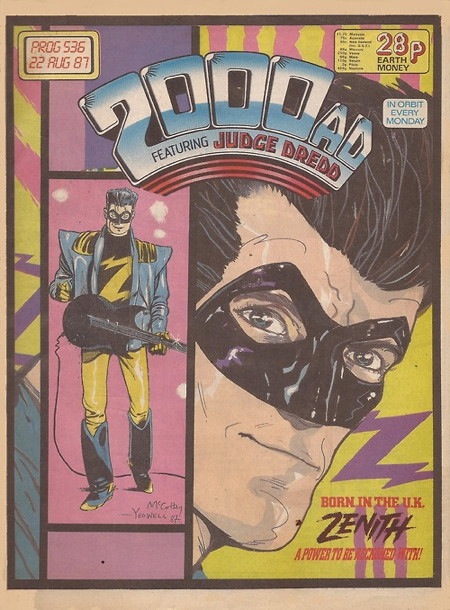
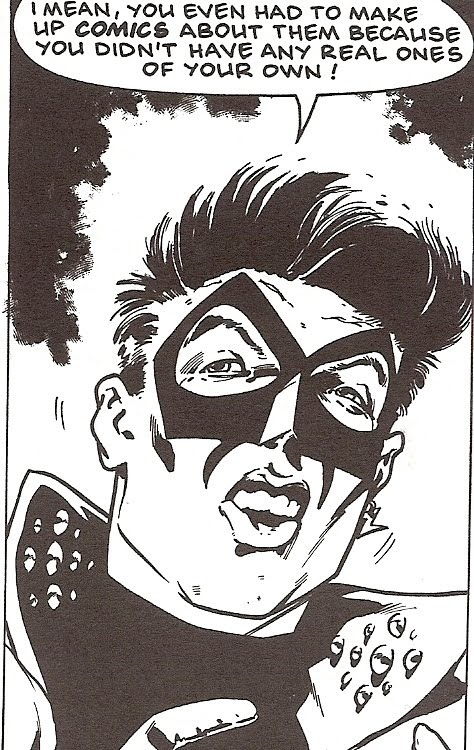
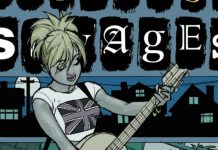
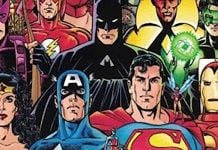
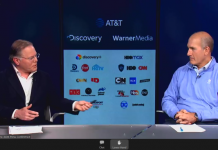



This 1000 print run comes across very shady to me. I was able to piece together my Zenith collection from individual 2000AD’s over the years. Though I would love to get my hands on a complete collection, but if it is meant to be, then it will happen.
Is it too far out of the way to say that Rebellion is doing this run to stake their claim as it were on the property? Even if Grant does own Zenith outright(though Yeowell and McCarthy deserve a piece of the pie), there were characters that showed up in Zenith that Grant doesn’t own, so getting some other publisher to reprint the series would be pretty tough one would think.
Wow, that’s…. um…. not exactly revealing? I can think of some politicians who could take lessons from Yeowell in political speech.
I think Steve has displayed huge integrity over this whole matter considering he has been deprived an income from some of his best work.
Given that Steve Yeowell still works for 2000 AD it’s a little hard for him to be able to say anything I should think. Which makes commenting on what he may be thinking one way or the other rather unhelpful.
It wouldn’t kill Rebellion to give Grant and Steve a percentage, just as a “goodwill gesture”. I think legally, assuming Rebellion bought 2000AD lock, stock and barrel, then they own it’s past and all it’s characters. 2000AD’s always been “work for hire” or whatever the phrase in comics is. With a few noted exceptions. Most creators had to just take it, not being as rich or as strong in the ego as Grant Morrison.
I dunno that Rebellion would see a profit in “buying” Zenith for the money Grant might want. They’ve got their hoards of computer-game money, and they are fans (which is pretty much why they bought the comic), but I don’t think it’d be worth it financially. Maybe they could settle for a per-copy license.
Though that would quite open the floodgates for every other story they own. And all the future ones! So prob no money’s gonna change hands. Assuming nobody spilled oil over the original contracts (Burt! You grexnix!), I reckon their case is watertight. Same rules as every other comic company. Most of the time.
In other news, I’ve been reading “Supergods”, and Grant’s STILL stinging over the slap Alan Moore gave him decades ago. Lots of sly digs conflating Moore’s incredibly baroque and well-structured stories with Moore being rigid and mechanical. Which he isn’t of course.
Very passive-aggressive for a Glaswegian skinhead.
At least Alan usually puts in an ending. The Invisibles ended in “and it was all a dream” in postmodern drag. Yeah, we know it’s a story. That’s why we bought it in Smiths instead of living through it.
Alan Moore’s a better writer, and a better magician. Weaving the human soul through the Universe while Grant sits wanking over his own name.
“They were the same as applied to other characters at IPC at that time.” – i.e. work-for-hire. Clearly doesn’t share Morrison’s post-dated claim to grab the rights.
Morrison is not the only one to challenge for rights – others did, and some got them. So “same as applied to other characters” could have more than just the one meaning.
@Greenaum I don’t think anyone is saying that Rebellion is NOT giving the creators the appropriate royalties. See the Rawhide thread on more discussion on that kind of topic.
The entire point that has been discussed before was that Grant asserts that he did not sign the contracts. So until a signed contract comes into being, he’s asserting his ownership rights.
And what’s with the slams against Morrison?
“strong in the ego”? Bringing Alan Moore into it?
Kinda petty of you.
But if you really want to get into it.
Invisibles ending: it was all a dream.
Watchmen ending: A giant spacemonster shows up and the world is no longer at war… um. okay.
@Rick – I think Steve is being very diplomatic and is choosing his words carefully. After all, he didn’t condemn the project nor did he praise/endorse it either. So to infer that he disagrees with Morrison regarding the ownership rights is reaching a conclusion from very scant evidence.
And “post-dated” claim? What makes you think that it’s “post-dated”? What makes you think that Morrison didn’t have the full intention and desire and belief of claiming ownership as the comic was being created?
Before anyone goes any further with this, there is no evidence or inference or anything ence that Rebellion is not paying Morriosn and Yeowell or anyone royalties not due them.
In fact I have heard that royalties are being paid from a pretty good source.
So let’s take that off the table.
Probably worth pointing out for some of the commentators that missed it a gem that came up in the comments of Padraig’s (excellent) series on the Marvelman rights – “work for hire” as a concept doesn’t exist in UK law in the same form as US law. It’s up to the publishers to prove that they bought the rights with the work (which otherwise remains copyright to the authors), something which Rebellion are clearly struggling to do.
As Laura mentioned above, there is some precedent already for folks successfully claiming their rights back to work that appeared in 2000AD, usually following an attempt by the Galaxy’s Greatest Magazine to continue a character or story without the involvement of the original creators (possibly including Mark Millar with Canon Fodder).
Nitpicking I’m sure, but were Fleetway still owned by IPC when Zenith started? Or had they already been sold to Robert Maxwell? I’ll check that one when I get home…
Fair play to Steve for plowing the furrow that’s best for him – he’s still regularly working for Rebellion and thouroughly deserves whatever cut of this Zenith collection that’s coming his way. I hope there’s no hard feelings between him and Grant.
…which would of course be absolutely guaranteed if this were Alan Moore ;)
@The Beat – That’s good to hear, and certainly an improvement over Rebellion’s predecessors as custodians of this material. I don’t think Fleetway payed any royalties on any of the collections they put out through Titan.
There’s an interview with Morrison somewhere where he talks specifically about the Titan Zenith reprints, and how payment for an introduction and newly comissioned cover were all the creators ever saw from any TPB sales.
jonboy: “And “post-dated” claim? What makes you think that it’s “post-dated”? What makes you think that Morrison didn’t have the full intention and desire and belief of claiming ownership as the comic was being created?” – because the copyright statements on the comic at the time didn’t contain specific statements, like for Mazeworld etc. Common sense tells us that it was a standard 2000AD series like all the others, but lack of proof/contract is another matter… Unless you’re telling us you think he avoided contracts at the time in the hope of retaining ownership. :) For sure post-dated because I’m sure if he’d claimed ownership at the time, there would be a copyright statement or he would have been given a contract to sign.
Laura Sneddon: “Morrison is not the only one to challenge for rights – others did, and some got them.” Who?
I’m working on an upcoming comprehensive piece that details the histories involved, without casting aspersions mind – based on known history only. Easier that writing bits and snatches in comments :)
And thankfully for me, it’s not as long as Padraig’s Marvelman series!
I look forward to the piece on Zenith, Laura. I hope, for the sake of your sanity, that it doesn’t get as long or as mad as the MM story.
I think there are interesting parallels between this and Marvelman, with the same sort of issues about there not being a written contract – although this is only conjecture in the case of MM, as nobody alive seems to actually know, one way or the other – and a possible future case involving Grant Morrison and the rights to Zenith might also cast some light on how contract law worked in UK comics, one way or another.
This situation strikes me as almost a mirror of Watchmen. In that, a series always intended to be creator-owned ended up becoming the property of the publisher in perpetuity. Here, a property almost certainly intended to be the property of the publisher may end up being owned by the creators, if they have the will and money to assert their legal rights. (And the solidarity: Morrison doesn’t need Rebellion but Yeowell does.)
There’s a similarity to Marvelman, too: nobody actually wants to own the character going forward. Yeowell says there were only ever going to be four books and Morrison’s shown no interest in the character. And Rebellion are kidding themselves if they think anyone cares about the further adventures of Zenith written by anyone but Morrison. All the interest is in the published work, and making it available to an audience that’d like a printed copy rather than scans.
Matthew Ellis: Yeowell’s also been “deprived of an income” from The New Adventures of Hitler, which he drew and Morrison wrote and was owned by Snobbery With Violence, a company set up by Morrison for a couple of creator-owned projects published in Fleetway’s Crisis. The artist seems to have coped under the weight of this great deprivation. Not every publication or lack thereof means somebody’s being ripped off…
(Blogged about aforementioned Hitler series here, BTW… http://bit.ly/Wp2t3l)
Tom: “This situation strikes me as almost a mirror of Watchmen. In that, a series always intended to be creator-owned ended up becoming the property of the publisher in perpetuity” – I read an interview where it was stated that the characters in Watchmen were originally planned by Moore to be the old Charlton characters. Doesn’t really tally with always being creator-owned.
The relevant Watchmen details Tom mentions are, I think, that Alan was told by DC, I think as part of the contract, that once Watchmen had been out of print for so many years, the rights would go to Alan. Watchmen hasn’t spent a minute out of print since the day it was published.
An obvious reason why is that people still want to buy it! But I think Alan sees it more as they’re doing it to gyp him of his rights. Or, at least, since it’s been a much bigger success than anyone could have imagined, DC might be decent enough to reconsider the contract in the circumstances.
From a financial point of view I don’t suppose you can blame them. Watchmen’s going to be profitable for years to come, as new generations discover it. It’s meant Alan will do no future work for DC, but how much would they make printing Tomorrow Stories anyway?
Though I’m sure Alan could write more blockbusters if he wanted to. But being semi-indie, and having enough money to live comfortably, he appreciates his freedom and writes the stuff he wants to.
I wonder what the chances are of Halo Jones book 4 – 9 are? If I were Rebellion I’d give him the rights to it wrapped in a great big kiss, just to have the chance to read new stories! I wouldn’t care who published it. Tho his style has evolved a bit since then. I noticed every episode of Halo ended on a mildly-ironic downbeat, it’s a trick that starts to look obvious eventually.
When Zenith was created, it was supposed to have its ownership transferred to the publisher, as it was standard (but not EXCLUSIVE!) at the time for 2000 AD. However, Morrison clains that the paperwork for that was never signed. It would mean by british law that the property belongs to him unless such paperwork appears. It would appear that Rebellion doesn’t have it anymore, if it ever existed.
If so, Morrison CAN claim ownership, but he may need to go to court to get it. If he hasn’t done it yet, I don’t think he ever will.
In any fashion, Rebellion does pay royalties, so both he and Yeowell will be financially rewarded for that publication, regardless of ownership. And with such a high cover price, they will probably be VERY well paid…
Jonboy, as DST mentioned, I didn’t think 2000AD creators got royalties on reprints. I’m surprised to hear they do, this is something Rebellion have started out of decency, then? I wouldn’t wanna be there when Tharg finds out about it!
In my hypothetical mental courtroom, I don’t know that “forgetting” to sign a contract would matter, if all parties went about things in the usual way they’d always done business. It depends I suppose on how the contract was non-signed, did Grant just “forget” or did 2000AD acknowledge his non-signing as being ok? Presumably he cashed their cheque, and they printed several series of Zenith, so some trade occurred. Grant didn’t complain at the time.
I always heard 2000AD, like all British comics, had pretty watertight and mean contracts. Creators get their initial fee and that’s it. Unless you’re one of the big writers and they want your stuff enough to negotiate a special deal.
I’m surprised to hear other creators got their rights back. How did it happen? Goodwill from Rebellion, sloppy 80s lawyers, or what?
And re Watchmen, the whole plot built up to a shocking ending with a bit of an aftermath, too. In The Invisibles we were promised a new wonderful world where everyone gets what they want, all the time. A massive post-modern party. The earlier episodes are full of it. What we get instead, is the Big Villain dies off-frame, King Mob goes into software publishing, then 5 minutes later the world ends. No Utopia, no ending, no nothing! Dane shockingly informs us it was just a story, as if that’s any excuse.
Basically The Invisibles started off great, meandered around being stylish for a few years, then stopped. Hence I’m a bit nonplussed with it.
Pedro, I think giving full ownership to 2000AD WAS exclusive practice at the time. The first creator-owned series I recall was Button Man in Prog 760-ish.
” I hope there’s no hard feelings between him and Grant.”
I met Morrison at a signing a few years back, and wanted to talk about ‘Skrull Kill Krew’ because I had been really into in when I was eleven or twelve (whatever year it was published).
His response would seem to indicate that there is no personal bad blood between he and Yeowell, but that he thought Yeowell had failed to deliver on Skrull Kill Krew. Something like “He just wasn’t the right artist for it.” Noticeably, they haven’t worked together since then.
so we hear the reprint we have all been waiting for is finally going ahead, and then its announced it will only be 1000 copies, so most people will have more chance of stepping foot on Mars then ever seeing a copy.
Its time for someone to say enough and resolve the issues over this gem of a graphic novel and get it out on full release as the fans have been demanding for years. Shame on all parties involved that it ever got to this stage.
UK copyright law says that copyright automatically belongs to the creator of a work, unless it’s explicitly assigned to somebody else, or is created by an employee in the course of their employment. Freelance assignments are contract work, not employment. The British comics industry seems to have operated for many years under the assumption that a page rate buys all rights, but that’s custom and practice, and the law says different.
Hilary Robinson, who wrote a lot for 2000AD in the 80s, asserted her rights to her creations when they tried to replace her as writer on one of her own series, and the publisher couldn’t dispute that legally. They had to concede she was right, but didn’t give her any more work after that. Since then other creators have tried the same thing, including Alan McKenzie over his character Luke Kirby, Mark Millar over Canon Fodder, and of course Grant Morrison over Zenith.
2000AD have paid royalties since about 1989, when John Wagner confronted Fleetway, as the publisher then was, over the lack of royalties he received on Judge Dredd merchandise, and things were reformed. But it seems the attitude to contracts remained very lax into the 90s, when the likes of Canon Fodder and Big Dave, the ownership of both of which is disputed, were published.
Comments are closed.